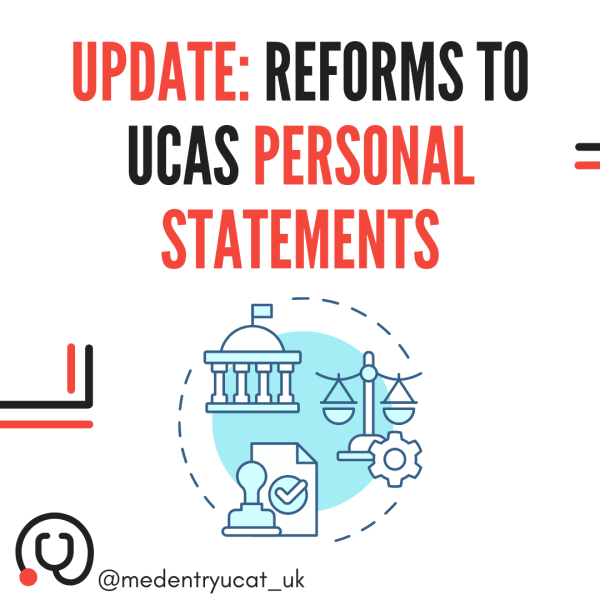UCAS Personal Statement Updates

1 year ago by Chris
The personal statement has long been a crucial component of UK university admissions, offering a unique insight into applicants' motivations, aspirations, and suitability for their chosen courses. Recently, UCAS announced significant changes to personal statements, aiming to enhance clarity, fairness, and effectiveness in the admissions process. This blog explores the rationale behind these changes, what applicants can expect, and the implications for future medical school aspirants.
Why is UCAS making changes to the personal statement?
UCAS has initiated these reforms in response to concerns from students regarding the personal statement process. A 2022 UCAS student survey revealed that while many students recognise the fairness and legitimacy of personal statements, an equal number find the process stressful and confusing.
The primary objectives of the reform are to:
- clarify for students what information is crucial in articulating their suitability for courses.
- increase students' confidence and understanding of what should be included in their statement.
- minimise stress and ambiguity in the application process.
- facilitate easier comparison of applicants' suitability by universities and colleges.
What changes are being made to personal statements?
Although the consultation phases are ongoing, UCAS has shared that the personal statement will transition from the current free-text format to a series of structured questions focusing on key themes. This new approach aims to provide clearer guidance for students and facilitate a fairer comparison for admissions officers.
What will be covered in the new personal statements?
UCAS has confirmed the following three key themes for the new questions:
1. Motivation for the Course: Why do you want to study this course?
This section explores the motivations behind the student's decision to pursue a career in medicine. It offers an opportunity for students to articulate their passion and commitment to the field. Each student has a unique set of reasons and experiences that drive them toward becoming a doctor. Universities are particularly interested in understanding these personal factors and what inspires students to choose this demanding and rewarding profession.
2. Preparedness for the Course: How has your education prepared you for success in this course?
This section provides students with the opportunity to discuss how their prior educational experiences have prepared them for medical school. Students can highlight distinctive achievements, such as academic awards, participation in debate competitions, involvement in research projects, and other noteworthy experiences that make them stand out. This is their chance to demonstrate how their unique background and accomplishments will contribute to their success in medical school.
3. Preparation through Other Experiences: What other preparations have you made, and how will these be helpful?
Experiences play a crucial role in a student's journey to medical school. This section invites students to discuss their work experience, volunteering, and personal medical stories that have uniquely shaped their path toward applying to medical school. By sharing these impactful experiences, students can illustrate the depth of their commitment and the personal growth that has prepared them for a career in medicine.
As well as the three key questions above, UCAS have highlighted the importance of ‘Extenuating circumstances’. This question will not apply to all applicants but has been added to highlight any important factors that the student feels is applicable under this category.
When will personal statements be changed?
UCAS aims to implement these reforms for the 2026 entry cycle.
Implications for future applicants
The reforms to personal statements by UCAS represent a significant evolution in the UK university admissions process, striving to enhance transparency, clarity, and fairness for all applicants. By transitioning to a structured question-based format, UCAS seeks to empower applicants to present their qualifications and aspirations more effectively.
At MedEntry, we are dedicated to keeping applicants informed and prepared for any updates to UCAT, interviews, personal statements, and other university admissions processes as they arise. Our personal statement review service helps students compose standout personal statements, increasing their chances of gaining entry into medical school.
Stay tuned for further updates as UCAS continues to refine the admissions process, ensuring that all applicants have the best possible opportunity to showcase their potential.


